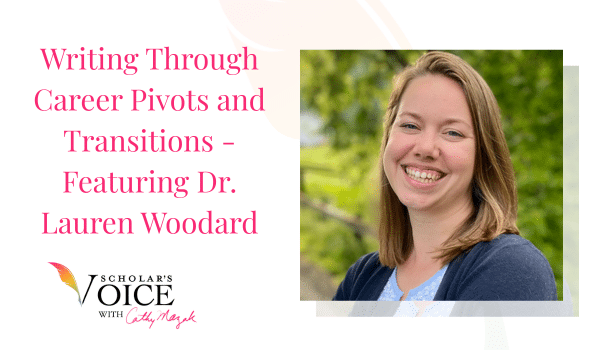[Emotions And Writing Series] How You Feel About Writing Is Important

I am launching a new podcast series,’ Emotions and Writing.’ In this series, we will cover the most common emotions people struggle with when writing in their academic careers. After the strong response to our episode, ‘You Can’t Write When You’re Mad,’ I was inspired to delve deeper into how emotions influence writing practice.
MORE DETAILS
In today’s episode, we discuss the significance of recognizing and addressing your emotions and their impact on your writing. Writing is inherently emotional, and it’s difficult to write academic papers when feeling stressed, sad, or overwhelmed. Acknowledging these emotions and understanding their effects humanizes the academic experience.
After discussing the effects of emotions on writing, I outline the topics we’ll tackle throughout this series and encourage you to think about how you want your writing practice to feel. Join me on the journey of intentionally creating positive feelings about your writing practice, so you can build the career you want, be more inspired, and maintain a flowing publication pipeline.
Why Acknowledging Emotions is Important
Acknowledging our emotions is essential because how we feel influences how we engage with and manage our writing. Recognizing and understanding these emotions humanizes the academic experience, making it less isolating. By addressing our feelings, we can better manage them, leading to more productive and fulfilling writing sessions. Understanding and dealing with our emotions fosters a more balanced and effective writing practice, contributing to a healthier and more productive academic career.
Outlining the Podcast Series
Each episode of the podcast series will be dedicated to a different emotion that affects the writing practice. I will discuss overcoming negative feelings and cultivating more positive emotions that support your writing practice.
Here’s a sneak peek at what’s coming up:
- Procrastination: We’ll explore how procrastination is often tied to our emotions rather than laziness. Understanding this connection can help us tackle procrastination more effectively.
- Motivation: We’ll dig into what drives motivation, how to cultivate it, and how to address it when it’s lacking.
- Grief: We’ll discuss how to handle grief related to changes or losses in your academic career and how to move forward with your writing despite these challenges.
- Guilt: I’ll address how feelings of guilt can hinder writing productivity and strategies for managing these feelings.
- Overwhelm: We’ll talk about strategies to cope with feelings of overwhelm, especially during busy academic periods, and how to regain control of your pace and productivity.
- Positive Relationships with Writing: Finally, we’ll focus on creating and nurturing a positive, fulfilling relationship with your writing practice.
How Do You Want This to Feel?
As we embark on this series, I encourage you to reflect on how you want your writing practice to feel. What emotions do you want to experience during your writing process? Understanding and pursuing these emotions can help create a more joyful and productive writing experience. So, I challenge you to answer this question: How do you want your writing practice to feel? Target three adjectives. In a future episode, I will share how to make those positive emotions a goal and explain how to work backward to create that feeling.
“I think it is so important to talk about emotions and writing because it humanizes the academic experience and professional experience which is something that is really really important if you are going to stay in the career for the long haul.”
“I think that writing is a very emotional experience. It is really really hard to write papers when you’re sad, when you feel overwhelmed, when you feel stressed out, when you feel grief, or when you are recovering from illness. It is very, very difficult to write those emotions. One of the things that I talk about on this podcast, but also that’s really important inside of our Navigate program is your relationship with your writing and that when you are creating a writing practice that you are cultivating positive feelings around your writing and joy in your writing. ”
We’ve opened the waitlist for our next cohort of Navigate: Your Writing Roadmap®. Check out the program details and get on the waitlist here.
CONTINUE THE CONVERSATION:
- Our 12-week Navigate: Your Writing Roadmap® program helps tenure-track womxn and nonbinary professors to publish their backlog of papers so that their voice can have the impact they know is possible. Get on the waitlist here!
- Cathy’s book, Making Time to Write: How to Resist the Patriarchy and Take Control of Your Academic Career Through Writing is available in print! Learn how to build your career around your writing practice while shattering the myths of writing every day, accountability, and motivation, doing mindset work that’s going to reshape your writing,and changing academic culture one womxn and nonbinary professor at a time. Get your print copy today or order it for a friend here!
- Want to train with us for free on your campus? Now you can when you recommend our Scholar’s Voice™ Faculty Retreats to a decision-maker on your campus! Download the brochure with the retreat curriculum and both in-person and online retreat options here.
- If you would like to hear more from Cathy for free, please subscribe to the weekly newsletter, In the Pipeline, at scholarsvoice.org. It’s a newsletter that she personally writes that goes out once a week with writing and publication tips, strategies, inspiration, book reviews and more.
CONNECT WITH ME:
RELATED PODCASTS
Stay current in Academic Publishing
Subscribe to our newsletter:
In the Pipeline
writing tips, publishing trends, reading recomendations, free workshops





